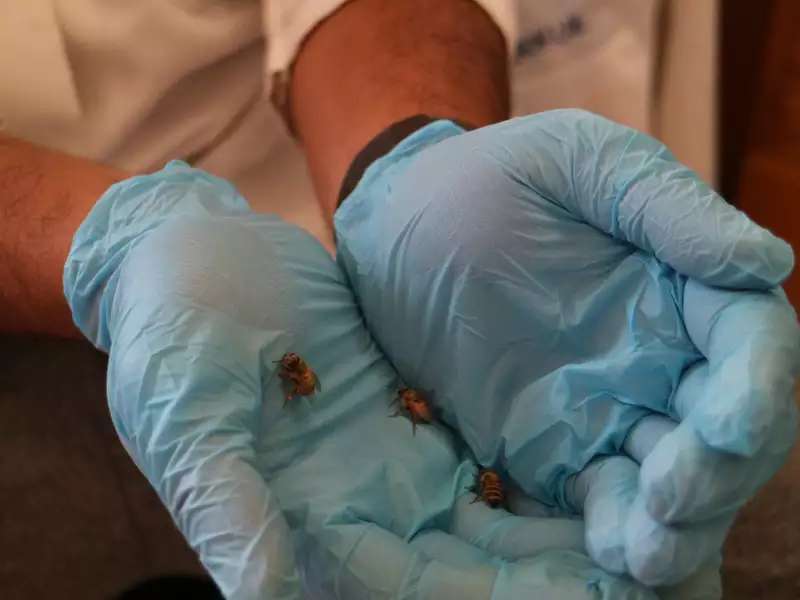1. Please introduce yourself.
My name is Annabelle (Eliana) Elikan, and I am a junior at Barnard majoring in Biology. Hailing from Silver Spring, Maryland, I spent a gap year in Israel studying my heritage and working with disabled individuals before starting college. At Barnard, I am a part of the Snow Lab, President of the Columbia University Bioethics Society, a Crisis Counselor for Crisis Text Line, and an intern at Carnegie Hill Pediatrics. I am also a member of Columbia/Barnard Hillel, and a volunteer for Peace by PEACE where I teach nonviolent conflict resolution in local elementary schools. Moreover, I am a Teacher’s Assistant for both semesters of the Introductory Biology sequence.
2. Describe your research in the Snow Lab—what does an average day look like for you?
I have been a member of the Snow Lab since the Spring 2020 semester, and have worked on a variety of projects. Under Professor Jonathan Snow, the lab studies the cellular stress response of honey bees. In particular, I focus on a parasite infecting the bees called Nosema ceranae, which is believed to be acting in conjunction with several stressors to drive the decline in honey bee populations. In the past, I have helped establish the phylogenetic relationship between GATA zinc fingers, which are zinc-containing domains found in transcription factors, from microsporidian and free living fungi and have conducted research on the effects of certain antibiotics on infection levels. I am now focused on creating a knockdown mechanism for N. ceranae genes.
Contrary to most undergraduate institutions, Barnard enables student researchers to spearhead their own projects. This has allowed me to explore my own interests inside the laboratory and to understand the experiments I conduct on a deeper level. Furthermore, at Barnard, there is often direct communication and help received from the Principal Investigator. Professor Snow has been an unbelievable mentor and has provided me with the tools necessary to be a successful scientist.
Being surrounded by female scientists working together was, and continues to be, a formative experience.
3. What drew you to the Snow Lab and the Barnard Bees? How did you go about pursuing an undergraduate research opportunity?
I became interested in honey bees upon learning about the waggle dance, a figure-eight movement which forager bees use to share information about the direction and distance of a particular resource. In addition to other eusocial behaviors, the dance caused me to become fascinated with certain bee species. As a result, I decided to change my research path from studying the sex differences in aging and the progression of Alzheimer’s Disease, to examining a small, unicellular parasite infecting honey bees. To acquire my current position, I sent an email to Professor Snow explaining that I became interested in bees during (now retired) Professor Paul Hertz’s Introduction to Organismal and Evolutionary Biology course and how this was further affirmed during the lab portion of the class. Professor Snow and I set up a time to meet, and I have been working in the lab ever since.
4. What's your favorite memory/story from your time in the Snow Lab?
This past summer, I was a Columbia University Summer Undergraduate Research Fellow, which allowed me to conduct research full-time for ten weeks. Furthermore, as part of the program, I learned critical skills, such as scientific writing and presentation and was able to hone and develop laboratory techniques. Besides for being an incredible academic experience; there was a palpable sense of camaraderie in the lab. For instance, I distinctly remember one Friday afternoon having around 60 midgut dissections to complete before leaving the lab for the weekend. My fellow lab members offered to help and we formed a sort of dissection assembly line. Being surrounded by female scientists working together was, and continues to be, a formative experience.
5. What's coming up next for you in the lab/more broadly?
I am going to continue conducting research on knockdown mechanisms, but will focus on the type microsporidian species, Nosema bombycis. This will enable me to examine the genes of N. ceranae, a closely related species. After graduation, I hope to conduct research on the effects of trauma on long-term epigenetic modification.
6. How can students contact you?
Please feel free to contact me with questions about being a Teacher’s Assistant, a Biology major, or becoming involved in research. My email is abe2120@barnard.edu.





